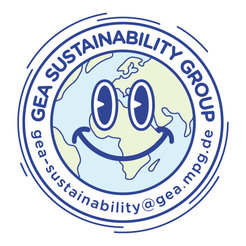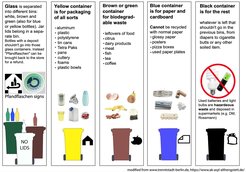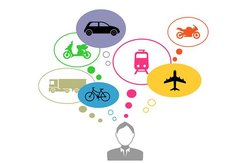Welcome to the MPI-Geoanthropology Sustainability Commission!
Our Goal: Make Research at the Institute More Sustainable

A group of institute members has joined forces to raise the awareness for more sustainability in our everyday life at the institute. We are working on many interesting ideas and some of our initiatives have already been successfully implemented. We are happy if you want to join us of if you have any suggestions. Just contact one of our members directly or write to our mailing list.
You can learn more about the Max Planck Society’s Sustainability Network here.
Make a contribution, it can be so easy!
At the institute
Seperate Waste for Recycling
Although the trash in common areas is separated and properly disposed of, trash cans in individual offices are not. Please ensure that you sort your trash and carry the recycling out of your office.

Rethink food shopping
- Offer vegetarian and local food at institute meetings
- Please contact us for information on catering services in Jena that offering local and/or organic food!
- Here you can find a comparison of different organic labels:
In Your Own Office
Use of recyclable paper and envelopes:
In March 2021 We changed our paper and envelope consumption to products with the environmentally friendly label “Blauer Engel”. Paper and envelopes with this label are made to 100% from recycled paper.
- Recycled paper is made from waste paper, no fresh wood is needed
- Significantly less water and energy used than in the production of virgin fibre paper
- Transport distances are shorter (it comes from Germany)
- Use of chlorine and other pollutants prohibited
Small things with which every individual can make a contribution:
Energy saving
- Turn off the lights when you leave your office for a while
- Put timers on the communal lights such as kitchens, hallways
- Do not leave on the heater with open window
- Turn off/down the heater when you are leaving the office in the evening
- Activate automatic screensaver mode on your computer
- Turn off computers when not in use (at night, during lockdown...)
Less printing
- Avoid colour printing unless necessary
- Printing on both sides of paper should be set by default on all printers
During lab work
- Separate waste: plastics, paper, glass, halogenated, non-halogenated, solvent and other laboratory waste
- Use fair-trade lab clothes and eco-friendly, plastic-free toiletries
- Reuse aluminium foils and gloves (if possible) and solvent bottles
We joined the LEAF programme!
In June 2021 we joined the LEAF certifiacation programme (Laboratory Efficiency Assessment Framework). This is a new programme developed to improve the sustainability and efficiency of laboratories: https://www.ucl.ac.uk/sustainable/staff/leaf
- Contains actions which lab users can take to save plastics, water, energy and other resources>
- Labs are awarded either a Bronze, Silver or Gold level depending on how many sustainability actions they take
- Labs taking part will reduce their carbon emissions and create an environment that supports research quality
Our labs are the first lab in Germany that joined the LEAF programme! 😊
Travel: Business Trips and Fieldwork

- For all business trips, choose a train or bus instead of a flight or a car. As of 2020, German Federal government has allowed business travel refunds to cover the full actual cost of more sustainable travel modes, even if the flight would have been cheaper.
- For business trips, purchase carbon offsets/ compensation (either the one that is provided with the booking, or another of your choice). These are allowed to be included in your business travel refund.
- Before leaving on fieldwork, choose sustainable materials to bring to the field, which will not impose unnecessary waste or burden on the place you are visiting. For example: biodegradable flagging tape, ...
- During fieldwork, provide waste separation bags/containers to your whole team. Be ready to take your rubbish and recycling back to Germany if the country you're visiting does not have its own facilities. Generally, aim to reduce waste that you create in the field.
- Encourage online conferences instead of in-person: online meetings have 1000-times smaller carbon footprint than in-person ones for meetings of more than 30 km distance from your home.
Interesting videos to learn more about important environmental issues
- Tap water resource (26 min via Arte)
- Raw material revolution (31 min via Arte)
- Wind power: Energy of the future (26 min via Arte)
- The science of water sustainability (25 min via Al Jazeera on YouTube)
- The Need to Achieve the Sustainable Development Goals in Papua New Guinea (7 min via UNIC Canberra on YouTube)
- Vanilla thieves of Madagascar (10 min via BBC News on YouTube)


